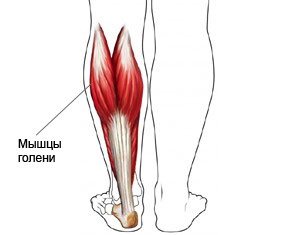Stretching the calf muscles
Description stretching calf muscles
Stretching the calf muscles – partial tear of the small fibers of the muscles. Calves are calf.

The reasons for stretching the calf muscles
Tension gastrocnemius muscle can cause:
- Strong tension of calf muscles, beyond the normal range of motion;
- Sudden pressure on the calf muscles;
- Too intense daily pressure on the calf muscles;
- Direct blow to the calves.
Risk Factors stretching calf muscles
Factors, which increase the likelihood of stretching the calf muscles:
- Sports, which runs at the speed required, such as:
- Run;
- Running Hurdles;
- Long jump;
- Basketball;
- Football;
- Rugby;
- Fatigue;
- The rigidity of the calf muscles;
- Overstrain;
- Cold weather.
Symptoms stretching calf muscles
Symptoms of calf muscle strain include:
- Pain and tenderness in the calf;
- Stiffness in the calf muscles;
- The weakness of the leg muscles;
- Pain when pushing off foot or standing on tiptoe;
- Bruising on the calf (if ruptured blood vessels);
- Click (rarely, at break muscle).
Diagnosis stretching calf muscles
The doctor will ask about your symptoms, recent physical activity, About, how the accident occurred, will examine the injured area, to find:
- Increased sensitivity and / or bruising in the area of the gastrocnemius muscle;
- Pain in the calf muscle reduction.
Tests may include:
- Blood tests;
- MRT – test, which uses magnetic waves, to take pictures structure inside the knee joint;
- Doppler ultrasound – test, which uses sound waves to study the organs.
Stretching the calf muscles are graded according to their severity.
1 the degree of stretching of the calf muscles
- Tension with micro- breaks on some muscle fibers;
- Full recovery may take about 2 to 3 weeks.
2 the degree of stretching of the calf muscles
- Partial tearing of muscle fibers;
- Recovery may take 1 to 2 months.
3 the degree of stretching of the calf muscles
- Complete rupture of the muscle fibers;
- Full recovery may take more 3 months.
When serious stretching calf muscles of athletes may need MRI. Scan will calculate the length of recovery.
Treatment stretching calf muscles
Treatment depends on the severity of the injury, and typically includes:
Medications
Your doctor may recommend taking painkillers light, such as aspirin, ibuprofen or acetaminophen, which will help ease the pain.
If while taking these drugs feel pain in the calf muscles, Do not resume physical activity without a doctor's permission.
Self-help
For the first 24 hours after stretching:
- Recreation – or perform actions, that cause pain (run, jumping, weightlifting using the lower leg muscles). You can not play sports, until the pain in his leg will not pass;
- Cold – Apply ice or a cold compress to the area stretching 15-20 minutes, 4 once a day, within a few days after the injury. Wrap the ice in a towel. Do not apply ice directly to the skin;
- Compression – wear elastic bandage around the lower leg, to prevent further swelling. Be careful, Do not wrap the bandage too tight;
- Keeping his feet on the height – keep your feet above the level of the heart as much as possible during the first 24 hours after injury, to minimize swelling;
- In the presence of a strong swelling is better not to take aspirin or ibuprofen during the first 24 hours of injury. These drugs may affect the mechanism of blood coagulation.
Further care after stretching calf muscles:
- Heat – Do not use heat in the first 3-5 days after injury. To warm up the muscles you need only, When you return to physical activity. Then use heat before stretching muscles or sports activities;
- Bracing – when the acute pain will pass, You can start slowly stretch the muscles as recommended by a doctor. Hold each stretch about 10 seconds and repeat 6 time. Perform stretching exercises 4-6 once a day;
- Strengthening the muscles – start exercises to strengthen the calf muscles as recommended by a doctor. It is very important to protect the muscle from further problems;
If you are diagnosed with a calf stretch, Follow your doctor's instructions.
Prevention stretching calf muscles
To avoid stretching the calf muscles:
- Develop strength calf muscle, so that they can absorb the energy of sudden physical stress;
- After a short warm-up is necessary to stretch the calf muscles to the considerable physical stress;
- It is necessary to learn the proper technique physical exercise and avoid traumatic situations in sports, by reducing muscle load.
